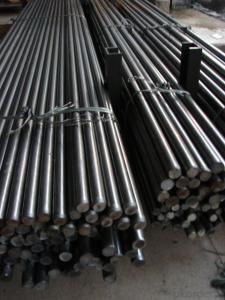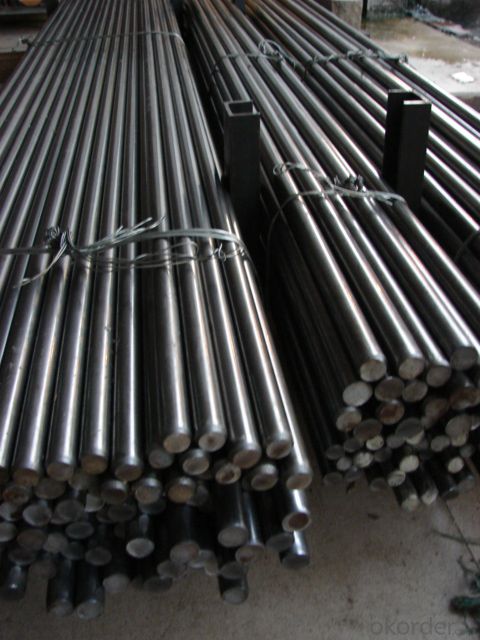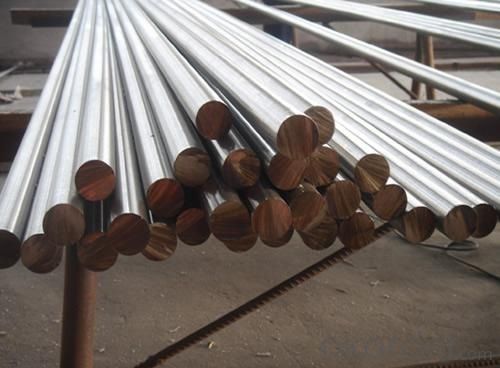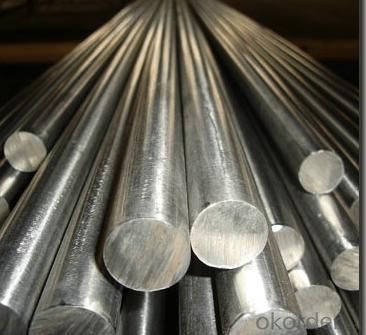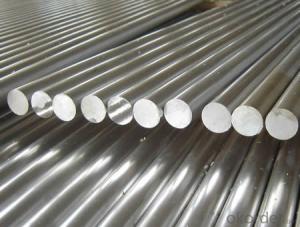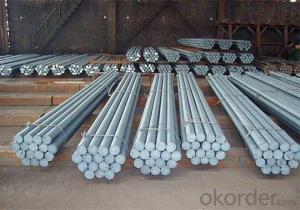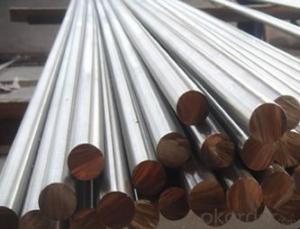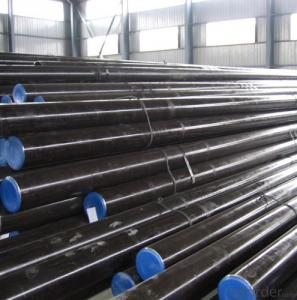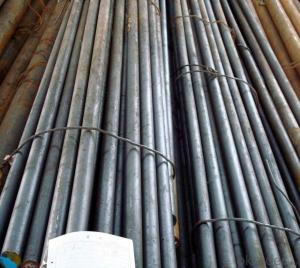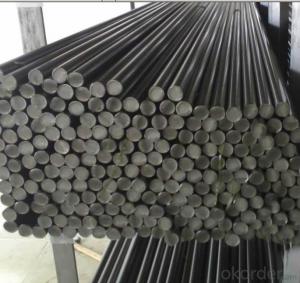High Quality Spring Steel Round Bar 28-32mm
- Loading Port:
- China main port
- Payment Terms:
- TT or LC
- Min Order Qty:
- 100 m.t
- Supply Capability:
- 10000 m.t/month
OKorder Service Pledge
OKorder Financial Service
You Might Also Like
High Quality Spring Steel Round Bar 28-32mm
Product Description:
Spring Steel can be divided into two types. One is carbon spring steel, and other one is alloy spring steel.
Alloy spring steel is based on carbon spring steel, by adding one or more alloying elements to improve the mechanical properties, hardenability and other properties to meet the requirement for manufacture all kinds of spring steel.
Specification of High Quality Spring Steel Round Bar 28-32mm:
-Material: 1065
-Standard: ASTM
-Production: Hot rolled or cold rolled
-Type: Spring Steel
| Diameter(mm) | Mass(kg/m) | Section(mm2) |
| 28 | 4.83 | 615.44 |
| 30 | 5.55 | 706.5 |
| 32 | 6.31 | 803.84 |
Corresponding Steel Grade of High Quality Spring Steel Round Bar 28-32mm for Reference:
USA, ASTM | CHN, GB/T | JPN, JIS | ISO |
1065 | 65 | SWRH67A SWRH67B | Type SC Type DC |
FRA, NF | GBR, BS | ||
C66D | C66D |
Chemical Composition of High Quality Spring Steel Round Bar 28-32mm:
C | Mn | Ni | Si |
0.62~0.70 | 0.50~0.80 | ≤0.30 | 0.17~0.37 |
P | S | Cr | Cu |
≤0.035 | ≤0.035 | ≤0.25 | ≤0.25 |
Mechanical Properties of High Quality Spring Steel Round Bar 28-32mm:
-Tensile Strength σb (MPa): ≥695
-Yield Strength σs (MPa): ≥410
-Elongation δ10(%): ≥10
-Percentage reduction of area: ψ (%): ≥30
-Hardness HBS, no heat treatment: ≤255
Usage/Applications of High Quality Spring Steel Round Bar 28-32mm:
-ASTM1065, is medium-high carbon spring steel. After heat treatment, this type of steel obtains high strength, hardness and elasticity but this material isn’t perfect for welding.
-Its fatigue strength is equal to alloy spring steel when they are in same configuration.
-For manufacturing spring, spring circle, all kinds of grommet, clutch, and axels in the production of normal machine.
Packaging & Delivery of High Quality Spring Steel Round Bar 28-32mm:
-Packing Detail: The products can be packed in bundles by steel wires.
-Marks: There are two types of marks. One is color mark and other one is tag mark. We paint color marks on both ends of bundles to make sure that it’s more convenient for customers to distinguish their products from other products at the destination port. The tag marks will be tied up to each bundle to make sure that customers know the specifications of each bundle like product’s name and size and other information of products.
-Delivery Detail:
1, Delivery time: 30~60 working days after receive buyer’s T.T. or L/C.
2, Delivery status should be written in the contract. (Heat treatment or no)
FAQ:
Q1: Why buy Materials & Equipment from OKorder.com?
A1: All products offered byOKorder.com are carefully selected from China's most reliable manufacturing enterprises. Through its ISO certifications, OKorder.com adheres to the highest standards and a commitment to supply chain safety and customer satisfaction.
Q2: How do we guarantee the quality of our products?
A2: We have established an advanced quality management system which conducts strict quality tests at every step, from raw materials to the final product. At the same time, we provide extensive follow-up service assurances as required.
Q3: How soon can we receive the product after purchase?
A3: Within three days of placing an order, we will arrange production. The shipping date is dependent upon the quatity, how many sizes you want and the plan of production, but is typically 1 month to 2 month days from the beginning of production.
Images of High Quality Spring Steel Round Bar 28-32mm:
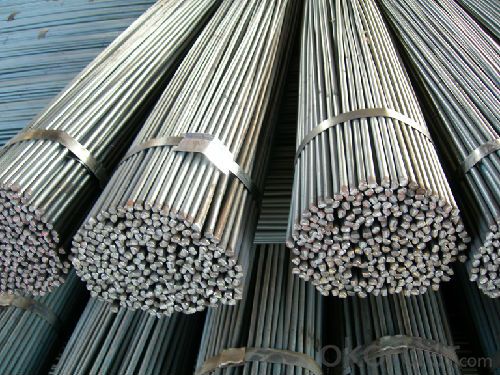
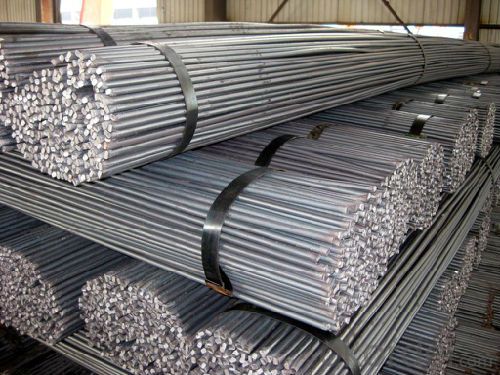
*If you would like to get our price, please inform us the size, standard/material and quantity. Thank you very much for your attention.
- Q: What are the non-destructive testing methods used for special steel?
- There are several non-destructive testing (NDT) methods that are commonly used for special steel. These methods are designed to detect flaws or defects in the steel without causing any damage to the material. One of the most widely used NDT methods for special steel is ultrasonic testing. This technique involves sending high-frequency sound waves through the steel and analyzing the echoes that are reflected back. By measuring the time it takes for the sound waves to travel through the steel and return, technicians can determine the thickness, density, and internal structure of the material. Ultrasonic testing is particularly effective at detecting cracks, voids, or inclusions in the steel. Another commonly used NDT method for special steel is magnetic particle testing. This technique involves applying a magnetic field to the surface of the steel and then coating it with a magnetic powder. Any defects or irregularities in the steel will create magnetic flux leakage, causing the magnetic particles to cluster and form visible indications. This method is particularly effective at detecting surface cracks or discontinuities in the steel. Liquid penetrant testing is another NDT method that is often used for special steel. This technique involves applying a liquid dye or fluorescent material to the surface of the steel. The dye penetrates any surface cracks or defects, and after a specified dwell time, excess dye is removed. A developer is then applied, which draws out the dye from any flaws, making them visible under UV light. This method is effective at detecting surface discontinuities and is commonly used in the aerospace and automotive industries. Radiographic testing is another NDT method that can be used for special steel. This technique involves exposing the steel to X-rays or gamma rays and capturing the resulting image on a film or digital detector. By analyzing the radiographic image, technicians can detect internal flaws such as cracks, voids, or inclusions in the steel. This method is particularly useful for thicker sections of steel or when access to the material is limited. In conclusion, non-destructive testing methods such as ultrasonic testing, magnetic particle testing, liquid penetrant testing, and radiographic testing are commonly used for special steel. These methods allow for the detection of flaws or defects in the steel without causing any damage to the material, ensuring its integrity and reliability.
- Q: What are the main corrosion resistance properties of special steel?
- The main corrosion resistance properties of special steel include high resistance to rust, oxidation, and corrosion in various environments, such as acidic, alkaline, and marine conditions. Special steel is often alloyed with elements like chromium, nickel, and molybdenum, which form a protective layer on the surface and enhance its resistance to corrosion. Additionally, special steel may have a low carbon content, reducing the likelihood of corrosion caused by carbide precipitation. These properties make special steel a reliable choice for applications where resistance to corrosion is crucial, such as in the construction, automotive, and aerospace industries.
- Q: Can special steel be used in the power generation equipment manufacturing industry?
- Yes, special steel can be used in the power generation equipment manufacturing industry. Special steels, such as high-strength or heat-resistant alloys, are often utilized in the manufacturing of turbine components, boiler tubes, and other critical parts of power generation equipment. These steels offer superior mechanical properties, resistance to high temperatures, and corrosion resistance, making them suitable for the demanding operational conditions in the power generation industry.
- Q: Can special steel be used in the jewelry industry?
- Yes, special steel can be used in the jewelry industry. It is often used as an alternative to precious metals like gold or silver due to its durability and affordability. Special steel can be used to create unique and stylish jewelry pieces, such as rings, bracelets, and necklaces, that are resistant to tarnish and wear.
- Q: What are the advantages of using special steel over other materials?
- There are several advantages of using special steel over other materials. Firstly, special steel offers superior strength and durability, making it ideal for applications that require high load-bearing capacity or resistance to wear and tear. Secondly, special steel has excellent corrosion resistance properties, which is particularly important for industries such as construction, automotive, and marine. Additionally, special steel can be easily customized and shaped to meet specific design requirements, providing flexibility in manufacturing processes. Lastly, special steel often exhibits high heat resistance and excellent mechanical properties, making it suitable for demanding environments and critical applications.
- Q: How does special steel perform in terms of machinability?
- Special steel typically has good machinability due to its composition and specific manufacturing processes. It is often designed to have improved cutting and chip formation properties, allowing for easier and more efficient machining operations. This allows manufacturers to achieve high precision and productivity when working with special steel, making it a favorable choice for various applications.
- Q: What are the different renewable energy grades of special steel?
- There are several grades of special steel that are commonly used in the renewable energy industry. These grades are specifically designed to withstand the harsh conditions and requirements of renewable energy applications. One of the most common grades of special steel used in renewable energy is stainless steel. Stainless steel is known for its corrosion resistance properties, which make it ideal for offshore wind turbines or solar panel frames that are exposed to moisture and saltwater. It is also used in geothermal power plants, where high temperatures and corrosive environments are present. Another grade of special steel used in renewable energy is high-strength low-alloy (HSLA) steel. HSLA steel has a higher strength-to-weight ratio, making it suitable for applications that require lightweight structures with high strength, such as wind turbine towers or support structures for solar panels. Furthermore, there is advanced high-strength steel (AHSS) that is commonly used in the automotive industry but can also be utilized in renewable energy applications. AHSS offers excellent strength, durability, and impact resistance, making it suitable for components like blades or gears in wind turbines. Additionally, there is a grade of steel called weathering steel, which is often used in renewable energy applications that are exposed to outdoor elements. Weathering steel forms a protective layer of rust, which prevents further corrosion and eliminates the need for additional coatings. It is commonly used in solar panel support structures, transmission towers, or other outdoor equipment. Overall, the selection of the appropriate grade of special steel for a specific renewable energy application depends on factors such as the type of renewable energy source, the environment in which it will be installed, and the specific requirements of the project.
- Q: How is special steel used in the textile supply chain?
- Special steel is used in the textile supply chain for various applications such as manufacturing textile machinery, equipment, and tools. The high strength and durability of special steel make it ideal for creating components that can withstand the demanding conditions of textile production, including high temperatures, corrosion, and heavy loads. It is commonly used in the production of spinning machines, looms, needles, and other crucial parts, ensuring efficient and reliable textile manufacturing processes.
- Q: What is the impact of high temperature on the mechanical properties of special steel?
- The mechanical properties of special steel are significantly affected by high temperature. When subjected to high temperatures, special steel may experience thermal softening, which leads to a decrease in its mechanical strength. This is primarily caused by the reduction in yield strength and hardness of the material at elevated temperatures. One of the main consequences of high temperature on special steel is the decrease in its ability to resist deformation. At elevated temperatures, the steel becomes more ductile, making it more prone to elongation and plastic deformation. This increase in ductility can result in a loss of shape and integrity under load, leading to distortion, warping, or even component failure. Additionally, high temperatures can induce changes in the microstructure of special steel. Prolonged exposure to elevated temperatures can result in the formation and growth of grain boundaries, weakening the material's mechanical properties. Moreover, high temperature can facilitate the diffusion of impurities or alloying elements within the steel, altering its chemical composition and potentially affecting its mechanical behavior. Another consequence of high temperature on special steel is the decrease in its resistance to corrosion and oxidation. At elevated temperatures, the steel becomes more vulnerable to oxidation, leading to the formation of scales or even complete degradation of the material. This compromises the steel's mechanical properties, including its strength and toughness. In conclusion, high temperature has a detrimental impact on the mechanical properties of special steel. It reduces strength, increases ductility, alters microstructure, and decreases resistance to corrosion and oxidation. Therefore, it is crucial to consider the effects of high temperature when designing and selecting special steel for applications involving exposure to elevated temperatures.
- Q: What are the applications of tool steel?
- Tool steel has numerous applications in various industries. Some common applications include the manufacturing of cutting tools such as drills, saw blades, and milling cutters. It is also used in the production of dies and punches for metal forming processes. Additionally, tool steel finds applications in the automotive industry for the production of engine components, gears, and shafts. It is also used in the construction industry for manufacturing tools and equipment for cutting, drilling, and shaping materials like wood and concrete. Overall, tool steel is valued for its high hardness, wear resistance, and ability to withstand high temperatures, making it ideal for applications that require durability and precision.
Send your message to us
High Quality Spring Steel Round Bar 28-32mm
- Loading Port:
- China main port
- Payment Terms:
- TT or LC
- Min Order Qty:
- 100 m.t
- Supply Capability:
- 10000 m.t/month
OKorder Service Pledge
OKorder Financial Service
Similar products
Hot products
Hot Searches
Related keywords
